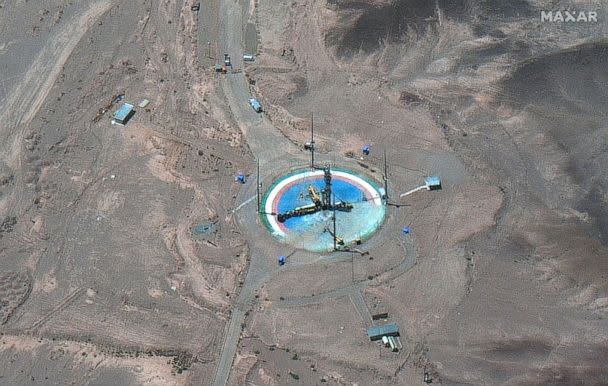Researchers and military figures associated with Iran’s Islamic Revolutionary Guard Corps, its nuclear program and its missile-development industry have either died after a series of “mysterious” incidents or were killed in planned assassinations over the past few weeks, according to the country’s local media.
Some officials in Iran and other experts said they believe that the deaths — which are happening amid increasing international tensions over Iran’s nuclear and missile programs — could be linked.
A commander of the Islamic Revolution Guards Corps said on Monday that the death of one of the “employees” at the Parchin military complex southeast of Tehran was due to “industrial sabotage.”
General Mohammad Reza Hasani-Ahangar, commander of the IRGC-affiliate military university of Imam Hussein, was referring to a May 26 explosion at the facility, in which Ehsan Qadbeigi, an engineer working at one of the research units, was killed. Parchin houses several industrial and research units.
MORE: Bloody protests in Iran are not just about food prices
On June 12, Ali Kamani, a junior officer of the IRGC Aerospace Force, died in a car accident in Khomein, a town in central Iran, according to a provincial IRGC statement.
The statement offered condolences to the Supreme Leader of the Islamic Republic, Ayatollah Ali Khamenei, and tagged Kamani as a “martyr” who worked for the aerospace force of the IRGC.
Within a few hours of that announcement, the semi-official Fars News Agency reported the death of another officer of the aerospace force, Mohammad Abdoos, who was “martyred” while on a “mission” in Semnan, a northern province and home to a space launch center.


Abdoos was also named a “martyr” in the report from Fars News, which is known to be close to the IRGC. The report did not provide an explanation for how he died.
“I think [this series of deaths] can indeed be linked, especially in the case of two deaths on the same day,” Farzin Nadimi, an associate fellow with The Washington Institute, told ABC News. He specializes in security and defense in Iran and the Gulf region.
Explaining the sensitivity of the IRGC units where Kamani used to serve, Nadimi said that the IRGC’s Aerospace Force “operates both ballistic missiles and suicide and armed drones, at what appears to be a logistical base in central Iran which might have been involved in the IRGC’s logistical air bridge to Lebanese Hezbollah.”
Abdoos used to work at the Aerospace Organization of Iran’s Ministry of Defense, which works on the design and development of ballistic and cruise missiles.
MORE: Iran celebrates revolution’s anniversary with defiant tone amid nuclear talks
“There are a large number of missile development and test centers in Semnan, where he reportedly died ‘in the line of duty,'” Nadimi said.
The two incidents followed another mysterious death of an aerospace engineer. Ayoob Entezari died after allegedly being poisoned, his relatives said, claiming that he had received death threats before he passed away.
Iranian judicial authorities, however, said he had not been a scientist but an ordinary employee of an industrial company and had passed away in a hospital after being sick.
The deaths of the aerospace-related officers happened a few weeks after two other mysterious deaths.
Colonel Ali Esmailzadeh, a commander of the notorious Quds Force, IRGC’s external operations unit, died on May 30 after falling from the roof of his home in Karaj, west of Tehran, the Islamic Republic News Agency reported.
Esmailzadeh was a colleague of Colonel Hassan Sayyad-Khodaei, who was shot dead in his car outside his home in Tehran in broad daylight on May 22.


General Hossein Salami, IRGC’s commander-in-chief, appeared to say that the U.S. and Israel are responsible for Sayyed-Khodaei’s killing, adding that Tehran would get revenge.
“The enemy, from the heart of the White House and Tel Aviv, followed him for months and years, door-to-door and alley-to-alley to kill him… God willing we will take revenge,” he said.
“If those deaths are indeed linked, and of ‘unnatural’ causes, Israel’s Mossad could be one of the main suspects,” Nadimi said.
Nadimi added that “we cannot say anything with total certainty” about who was involved, “as the nature of such works is.”
The Israeli Foreign Ministry did not respond to a request for comment from ABC News.
Iran embarked on expanded drone operations against Israel beginning in February 2018 when the Islamic Republic launched a drone from Syria. It tried again in 2021, launching two drones from Iraq earlier in the year.
MORE: Biden’s mounting nuclear threats from North Korea, Iran
According to The Jerusalem Post, Israel’s Defense Minister Benny Gantz has discussed drone threats from Iran many times over the last year. That report detailed how Iran has been training drone operators from the region.
Israeli Prime Minister Naftali Bennett on Sunday warned Iranian proxies that they would pay if they participate in Iran’s plots.
“We are currently witnessing Iranian attempts to attack Israelis in various overseas locations,” Bennet said at his weekly cabinet meeting. “The security services are working to thwart attempted attacks before they are launched. We will continue to strike those who send the terrorists. Our new rule is: Whoever sends — pays.”
The deaths came amid attempts by international officials to save the 2015 nuclear deal, the Joint Comprehensive Plan of Action, between Iran and world powers.
With the negotiations stalled, Iran’s nuclear capabilities, including its uranium enrichment level, signal the country is the closest its ever been to making a nuclear weapon, experts warn.
Iran’s “stockpile of uranium is now enriched to 60%, close to the roughly 90% weapons — and in a form that can be enriched further,” the International Atomic Energy Agency told ABC News in late May. “It grew from 9.9 kg to 43.1 kg. This number is approximate amount for manufacturing a nuclear explosive device. This possibility cannot be excluded.”
Israel opposes the JCPOA and the negotiations to restore it, saying it is “giving in to Iran’s nuclear blackmail.”
“Iran won’t just keep its nuclear program; from today, they’ll be getting paid for it,” Bennett said in an official message in November, amid talks to resume the deal.
The Islamic Republic, which is under tough economic sanctions, said it is still interested in pursuing talks.
“Iran won’t distance itself from result-oriented talks,” Iran Foreign Minister Hossein Amirabdollahian said on Twitter on Friday.
Calling on the U.S. “to be realistic” and to “abandon sanctions lunacy,” Amirabdollahian invited the IAEA to focus on “technical duties” instead of adopting a “politicized approach.”
Tehran accused the IAEA of politicizing its nuclear case and referencing “fake documents” in the verification process of its nuclear program, including what Israel provides to the agency.
Israel has openly boasted about its intelligence operation’s influence on Iran’s nuclear program.


Bennet on May 31 uploaded an extensive stock of secret documents of Iran’s nuclear program and shared the link with public access via his Twitter account, saying, “We got our hands on Iran’s deception plan.”
U.S. Department of State spokesperson Ned Price declined to comment June 16 about the possibility of the Iranian deaths being linked. He highlighted the White House’s commitment to its allies, saying, “Iran will never be able to acquire a nuclear weapon.”
Tel Aviv has announced that it has embarked on a new policy described as “a turning point in the Israeli strategy vis-à-vis Iran,” which it’s dubbed the “Octopus Doctrine.”
“In the past year, the State of Israel has taken action against the head of the terrorist octopus and not just against the arms as was done in previous decades,” Bennett said earlier this month. “The days of immunity, in which Iran attacks Israel and spreads terrorism via its regional proxies but remains unscathed — are over.”
MORE: Blinken meets Israel, Arab partners as looming renewed Iran deal rattles ties
Iranian President Ibrahim Raisi made it clear that Iran is determined to take revenge for the recent deaths.
“I have no doubt that revenge against the criminals for the blood of this martyr is assured,” Raisi said a day after the death of Colonel Sayyad-Khodaei.
The “Iranian regime and especially the IRGC are certainly conducting a major counterintelligence house sweep right now to identify and get rid of any foreign spy,” Nadimi said, emphasizing that “those deaths will not have any effect on Iran’s nuclear or regional policies.”
Israel’s Foreign Minister Yair Lapid on Monday urged citizens in Turkey to leave “as soon as possible” over threats that Iranian operatives are actively planning attacks on Israelis in Istanbul.
“Following the events of recent weeks in Turkey and after a series of attempts at Iranian terrorist attacks against Israelis who went on vacation in Istanbul, we call on Israelis not to fly to Istanbul and if you have no vital need do not fly to Turkey,” Lapid said on Twitter.
Iranian officers’ mysterious deaths probed amid rising tensions with Israel originally appeared on abcnews.go.com




